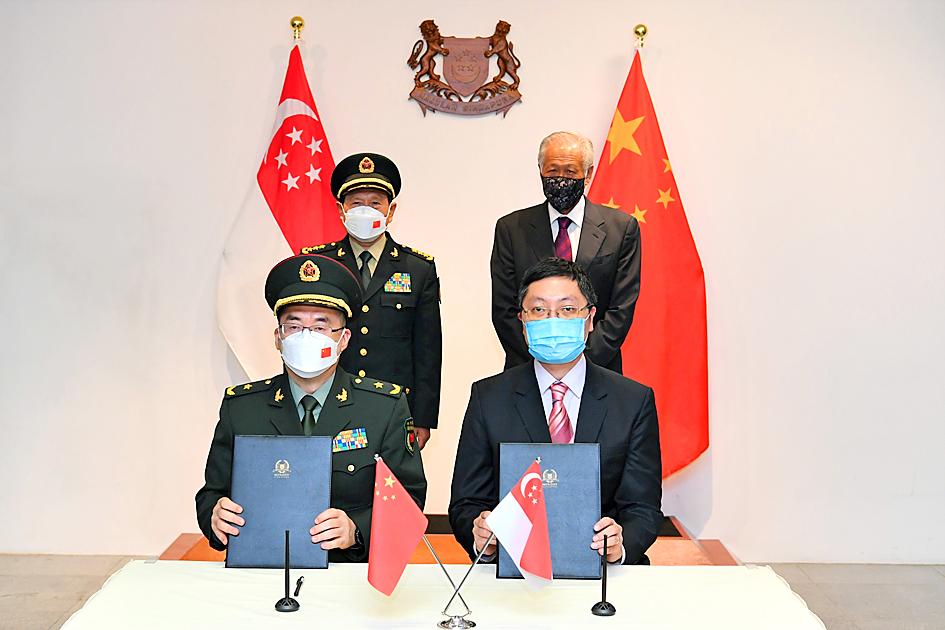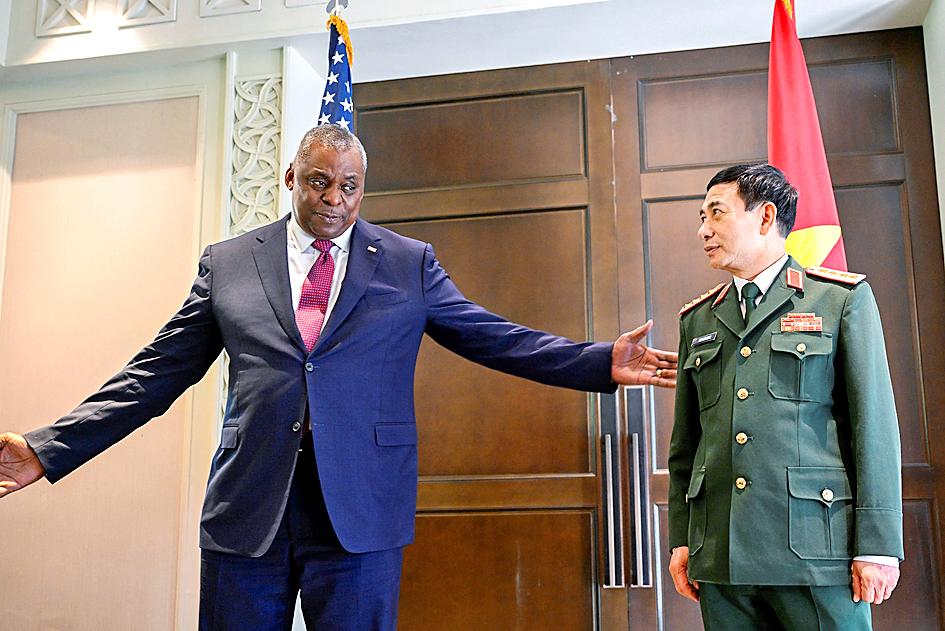Beijing would “not hesitate to start a war” if Taiwan declares independence, China’s defense minister warned his US counterpart in their first face-to-face talks, the Chinese Ministry of National Defense said yesterday.
“If anyone dares to split Taiwan from China, the Chinese army will definitely not hesitate to start a war no matter the cost,” it cited Chinese Minister of National Defense General Wei Fenghe (魏鳳和) as telling US Secretary of Defense Lloyd Austin on the sidelines of a summit in Singapore.
Beijing must “refrain from further destabilizing actions” on Taiwan, Austin said.

Photo: EPA-EFE
The US and China are expected to use the Shangri-La Dialogue, a major Asian security forum, to press their competing visions for regional stability, even as the war in Ukraine consumes Washington’s attention and Beijing struggles with economic pressures at home.
Austin and Wei are expected to deliver speeches at the event, which started late yesterday.
The US is seeking to use the three-day conference to push back against growing Chinese influence in the Asia-Pacific region, while also establishing guardrails to prevent competition from getting out of hand.

Photo: Reuters
Austin and Wei last spoke during a telephone call in April.
Japanese Prime Minister Fumio Kishida, a key US ally, was to give the opening event’s keynote speech.
He was expected to set out his views on expanding the US concept of a free and open Asia-Pacific region with an eye to the war on Ukraine and China’s military assertiveness.
Many nations attending have resisted pressure to take sides and have sought to avoid getting caught in the middle.
Singapore-based International Institute of Strategic Studies executive director James Crabtree said that while the focus is on the US and Chinese defense heads, as they are expected to meet on the sidelines of the conference, it remains unlikely that there would be any kind of breakthrough on new areas of cooperation between the two sides.
“You look during the Ukraine crisis — that has reinforced in the eyes of both the Americans and the Chinese that they’re not really acting in a way that is honest and forthright with each other,” he said in an interview with Bloomberg TV. “So part of the problem is it’s hard to see how you get better results out of that relationship.”
A flurry of bilateral talks between defense ministers have started ahead of the conference.
Austin and Singaporean Minister for Defence Ng Eng Hen (黃永宏) had one of the first bilateral discussions.
More than 30 defense ministers are in Singapore for the event.
Kishida, who had persuaded some traditional Southeast Asian partners of Russia to criticize its war in Ukraine, is expected to use his speech to bring others in Asia aboard.
Kishida has taken a tough stance on Russia’s attack on Ukraine and made frequent veiled warnings about the risk of a similar grab for territory by China.
A senior US defense official, who briefed reporters ahead of Austin’s arrival, said that the region has seen a clear trend toward self-isolating behavior by China.
Countries across the region are concerned by Beijing’s aggressive behavior, the official said, adding that the example of Ukraine looms large in the region, demonstrating the risks of disorder and spheres of influence.
The Pentagon is working to ensure that the meeting with Wei would be professional and substantive, the official said.
The US has no desire to create a public spectacle, the official said, referring to testy public exchanges between the US and China in the past few years.
The official said the US places a priority on improving crisis communications with Beijing.

SECURITY: As China is ‘reshaping’ Hong Kong’s population, Taiwan must raise the eligibility threshold for applications from Hong Kongers, Chiu Chui-cheng said When Hong Kong and Macau citizens apply for residency in Taiwan, it would be under a new category that includes a “national security observation period,” Mainland Affairs Council (MAC) Minister Chiu Chui-cheng (邱垂正) said yesterday. President William Lai (賴清德) on March 13 announced 17 strategies to counter China’s aggression toward Taiwan, including incorporating national security considerations into the review process for residency applications from Hong Kong and Macau citizens. The situation in Hong Kong is constantly changing, Chiu said to media yesterday on the sidelines of the Taipei Technology Run hosted by the Taipei Neihu Technology Park Development Association. With

A US Marine Corps regiment equipped with Naval Strike Missiles (NSM) is set to participate in the upcoming Balikatan 25 exercise in the Luzon Strait, marking the system’s first-ever deployment in the Philippines. US and Philippine officials have separately confirmed that the Navy Marine Expeditionary Ship Interdiction System (NMESIS) — the mobile launch platform for the Naval Strike Missile — would take part in the joint exercise. The missiles are being deployed to “a strategic first island chain chokepoint” in the waters between Taiwan proper and the Philippines, US-based Naval News reported. “The Luzon Strait and Bashi Channel represent a critical access

‘FORM OF PROTEST’: The German Institute Taipei said it was ‘shocked’ to see Nazi symbolism used in connection with political aims as it condemned the incident Sung Chien-liang (宋建樑), who led efforts to recall Democratic Progressive Party (DPP) Legislator Lee Kun-cheng (李坤城), was released on bail of NT$80,000 yesterday amid an outcry over a Nazi armband he wore to questioning the night before. Sung arrived at the New Taipei City District Prosecutors’ Office for questioning in a recall petition forgery case on Tuesday night wearing a red armband bearing a swastika, carrying a copy of Adolf Hitler’s Mein Kampf and giving a Nazi salute. Sung left the building at 1:15am without the armband and apparently covering the book with a coat. This is a serious international scandal and Chinese

COUNTERINTELLIGENCE TRAINING: The ministry said 87.5 percent of the apprehended Chinese agents were reported by service members they tried to lure into becoming spies Taiwanese organized crime, illegal money lenders, temples and civic groups are complicit in Beijing’s infiltration of the armed forces, the Ministry of National Defense (MND) said in a report yesterday. Retired service members who had been turned to Beijing’s cause mainly relied on those channels to infiltrate the Taiwanese military, according to the report to be submitted to lawmakers ahead of tomorrow’s hearing on Chinese espionage in the military. Chinese intelligence typically used blackmail, Internet-based communications, bribery or debts to loan sharks to leverage active service personnel to do its bidding, it said. China’s main goals are to collect intelligence, and develop a